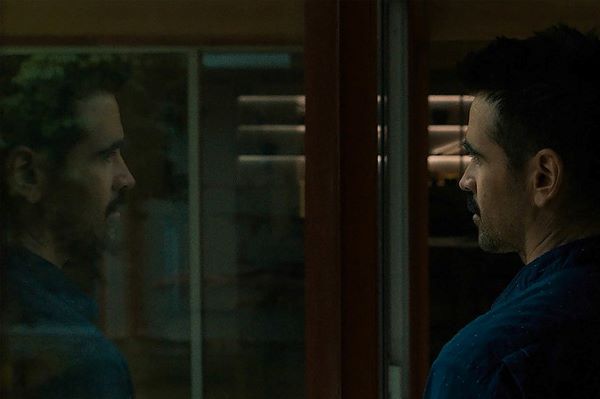There were some startling films in the second day of Sundance. Here’s our round-up of some of the movies that caught our eye, featuring thoughtful sci-fi, the various issues both natural and supernatural faced by three black women at an Ivy League university, and a portrait of one of pop and rock’s most controversial figures.
First up is Kogonada‘s After Yang (USA/ 2021/ 96 mins), the much-anticipated follow up to 2017’s Sundance favourite Columbus, and it’s just beautiful. This low-key sci-fi implies that Chinese culture has becomes ascendant and adoption of Chinese babies has become so common in the West that lifelike ‘techno-sapien’ robots have been created as older Chinese siblings. The aim is is to provide the human child with knowledge of their heritage. Yang (Justin H. Min) was a refurbished model that Jake and Kyra (Colin Farrell and Jodie Turner-Smith) had obtained for their daughter Mika (newcomer Malea Emma Tjandrawidjaja). Mika became so attached to Yang, that when he malfunctions, Jake sets out on a quest to get him reactivated. As he realises that his daughter’s best friend has basically died, Jake comes to accept what an integral part of the family Yang had become.
This beautiful film comes across as a benign take on the type of story that populates Black Mirror. As in that series, the technology in After Yang – self-driving cars, Alexa-like AI transplanted into humanoid for, glasses that can play films – feel like logical progressions of devices that already exist. But in Kogonada’s future, the implication isn’t necessarily dystopian. An introspective, subtle Farrell (his deadpan roles with Yorgos Lanthimos seem to have worked wonders) does really great work as his quest to get Yang back online forces a reboot of his connection with his family. Kogonada’s visual eye is unparalleled as he marries the intimate framing of Yasujirô Ozu to an unobtrusive futurism. If it sounds like an overtly stylistic exercise, don’t worry. Humanity remains both theme and focus. Witness the unalloyed joy of the opening credits, pure optimism in cinematic form. 5/5
Spectres metaphysical and metaphorical stalk the halls of an elite university in Master (Mariama Diallo/ USA/ 2022/ 91 mins). The fictional Ancaster University in New England is built near the site of a Salem-era witch hanging, but there at first appears to be more urgent issues for three different black women to navigate. Freshman Jasmine (Zoe Renee) is perturbed to discover her room was previously occupied by the university’s first black student, who jumped to her death from the window in the 1960s. Gail (Regina King) is the first black house ‘Master’ at the university (a title with all kinds of loaded historical baggage), brought in to improve the institution’s reputation for diversity. And Liv Beckman (Amber Gray) is a black professor looking to secure tenure from the – of course – white, male board.
Part ghost story, and part psychological horror, Master follows the aggressions – micro and macro – faced by the three women, and the various intersections of compromise and conflict they have to adopt in an environment that is very much not set up to facilitate their success. Not all the elements fully gel, debut filmmaker Mariama Diallo is perhaps too ambitious in the number of narrative plates she tries to keep spinning. But that ambition can’t be faulted, and she can certainly craft a sustained sense of unease on many levels, and punctuate them with effective, efficient shocks, and also an occasional impish streak of satirical humour. There are echoes of Candyman, Get Out, and even Suspiria in its varied DNA. Another very impressive first-time effort at the festival. 4/5
It’s impossible to watch the Nothing Compares (Kathryn Ferguson/ Ireland, UK/ 2022/ 97 mins), a rock doc covering the rise, brickbats and bouquets of singer Sinéad O’Connor without it being coloured by the awful news of her son Shane’s suicide earlier this month. O’Connor herself has been hospitalised herself in the wake of suicidal Tweets, and it feels like only the latest onslaught of pain for a woman who has suffered far more than her share. Thankfully, Ferguson takes great care to paint a rounded picture of her subject, as a musician first-and-foremost, her work informed by her well-documented ordeals, but not defined by them.
It’s a fairly standard documentary in many ways, but finds a nice juxtaposition in archive interviews with O’Connor; young, forthright, vulnerable, and the older, careworn woman she is now, her voice much lower and harsher. It covers all the touchstones you would expect over the years of 1987-1993. There’s her breakthrough at 20 with the The Lion and the Cobra, the iconic version of Prince‘s “Nothing Compares 2 U“, and her infamous ripping of her mother’s picture of Pope John Paul II on Saturday Night Live in 1992. It seems surprising given 30 years distance, just how huge she was at the time, and just what a trailblazing figure she cut. Many have followed on clearer roads because she cut the first path. A conventional portrait of an unconventional person perhaps, but a perfect introduction to a fascinating women who shattered her own spotlight. 3/5
